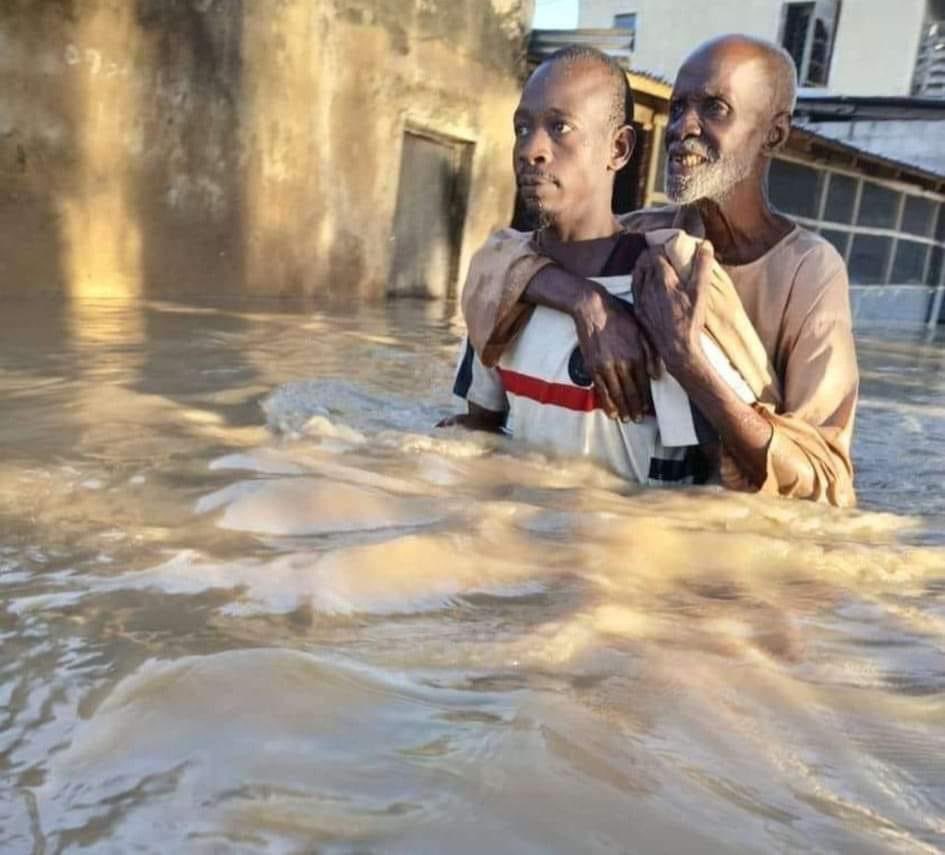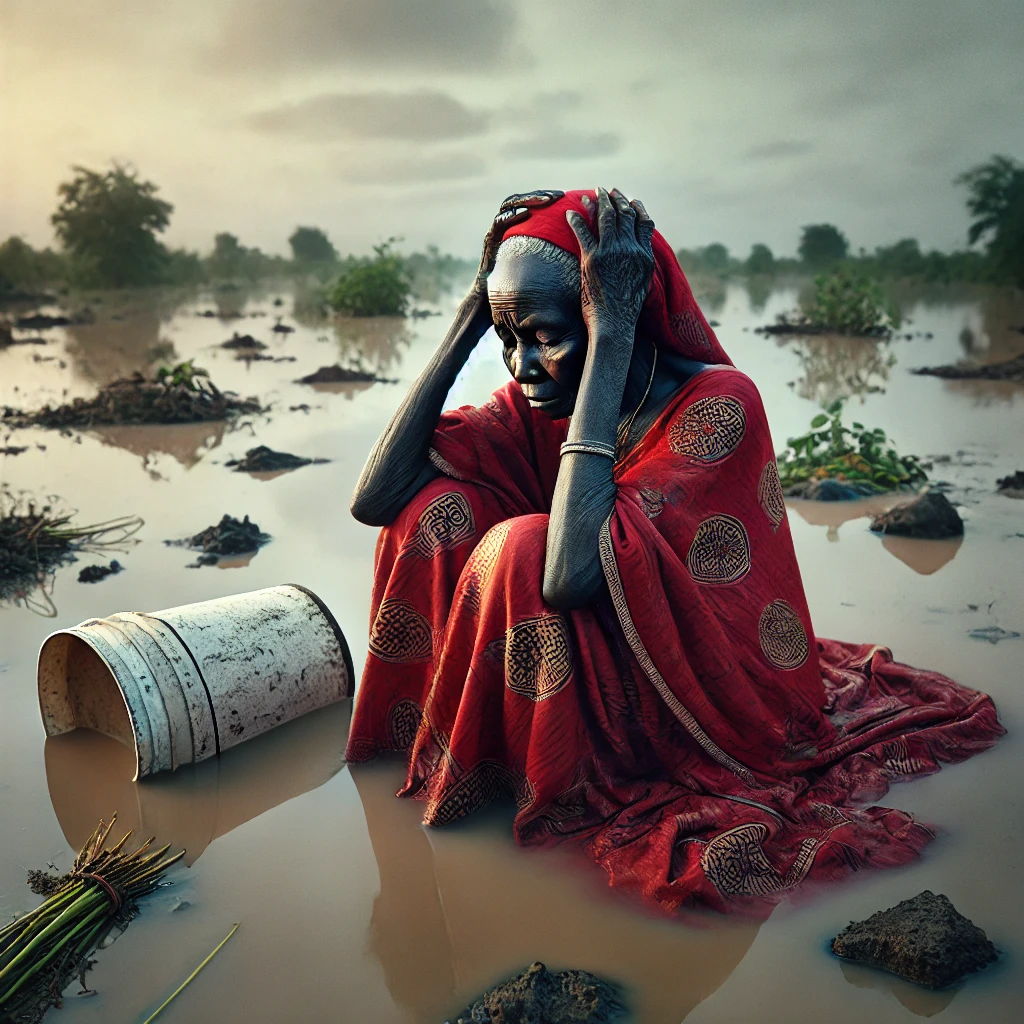
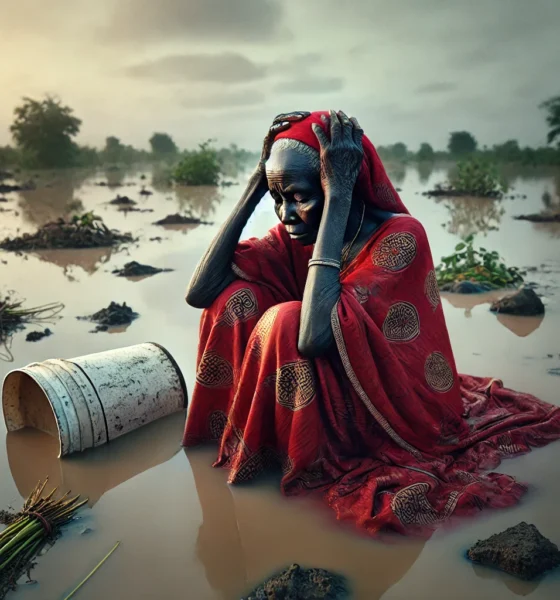
Environment
Lost anchors: Maiduguri women bear bitter burden of September flood
 Lost anchors: Maiduguri women bear bitter burden of September flood
Lost anchors: Maiduguri women bear bitter burden of September flood
- The flood took their homes, but it is hunger that seals their fate
- At the mercy of predators: Sad fate of widows, mothers, daughters adrift in wreckage of an unforgiving deluge
- Stripped of family, hope, their only constant is the struggle to survive

Helen Samaila, in tears, since her husband, Joseph disappeared with the flood waters
By Olatunji OLOLADE, Associate Editor
Halima Mohammed remembers her 15-year-old son, Ali, as a boy who went to bed a child and woke, mauled by floodwaters, into a man.
On Thursday, September 10, 2024, at the precise stroke of midnight, Mohammed and her children experienced nature’s wrath as water, let loose by the collapsed Alau Dam, tore through her home in Gwange.
As the waters gushed through her door, her heart pounded with a terror only a mother could know. She and her children laboured to drain their room with bowls and buckets, a frantic defence against the deluge turning their room into a watery tomb. Soon, the water engulfed their rooms, rising past her waist, cold and merciless.
Halima gathered her three daughters in a dash for refuge, but pleaded with her son, Ali, to join the neighbourhood males in rescuing the vulnerable—the children, the sick, the old. As her daughters clung to her, shivering and wide-eyed, she told her son: “Help those who cannot help themselves.”
The 15-year-old nodded in silent affirmation to his mother. The palpable fear on his face conveying his brutal awakening and chilling resonance of the moment – he was a child thrust by serpentine waters into the role of a man.
Mohammed watched as the 15-year-old waded off, slinking into the tempest, his figure faded away into the midnight currents. Amid the guttural wails of frightened families and drowning neighbours, she watched her son vanish completely from her sight. Praying silently for her son’s safety, Mohammed fled with her girls to the Kofan Biyu area.
“We attempted passing behind the government quarters but there was no road there because the water was too much, then we went to Abbaganaram. There we saw people going to the quarters area and we followed. We spent a night there but it became flooded too. So, we trekked to Baga Road, where we joined others fleeing to the Bakassi IDP camp. I’ve been here with my three girls, ever since,” said Mohammed.
At the Bakassi IDP camp, Mohammed has searched in vain, combing through faces, hearsays and memories, in a desperate bit to gaze upon her son’s brilliant eyes once more. But she couldn’t find him. She knows he was a hero that night; she dreads that he might be gone, forever. Yet she waits. “He went out to save others. He will come back,” she whispered, her voice lost in the din of her grief.
A housewife’s solitary vigil
For Helen Samaila, the flood was a thief not just of her home and belongings but of her family. In the chaos of the rising waters, she was torn from her husband and two sons. Panicking, she grabbed two of her six children, Dorcas and Rahaf, and fled with them, while her older sister managed to hold onto two others, Esther and Rufkatu. “I have six children, four girls, and two boys. So, I carried two and my older sister carried two of them,” she said.
Samaila’s husband and two boys vanished in the surge, leaving her to confront each morning with a gnawing uncertainty. For three days, she scoured the town’s ragged camps and temporary shelters. On the fourth day, she found her sons among a wave of displaced children, weary and sunken-eyed. But her husband, Joseph, remains missing. Each night, she tells her children that their father will return soon but her voice no longer carries the strength of conviction.
“I am tired of promising them his return,” she cried, her gaze sunken, like a well of sorrow. Without her husband, Samaila is a solitary pillar bearing the weight of six young lives. Joseph was the family’s breadwinner, a humble trader at the Gamboru Psychiatric Hospital road, whose earnings from his provision store sustained the family. Without him, Samaila is left to forage on meagre handouts, her sons reduced to menial labour despite their young age. “My sons, they have become labourers,” she lamented, in the tenor of a mother who knows that they are too young to bear such a burden. The tragedy here is not just one of survival but of the innocence drained from her children, leaving them to wrestle with adult despair in a world that offers no respite. She fears the day when their faces stop asking, “Where is our father?” and start understanding the dreadful silence of her reply.

Mohammed shows pictures of her son, Ali, who disappeared with the flood waters
Lives trapped by circumstance
Across Maiduguri, the flood’s cruel current has left thousands of women without a lifeline. In a city where opportunities for women are scarce, wives without income find themselves stranded on the shores of devastation. The flood destroyed homes and markets and the delicate webs of dependency these women had woven with neighbours, friends, and family. Widows who had leaned on children for food, or on neighbours for shelter, now face empty doorways and unanswered calls.
For mothers without husbands or children, those whose strengths were rooted in the safety of family, the floodwaters carried away more than possessions—they stole their very means of survival. Stripped of homes, the displaced women huddle in camps where food is a scarce commodity and safety is a distant memory. They lament their vanished sons and husbands, who used to be their only support.
Each woman’s story has the same bitter end. Farmlands have been buried beneath silt and mud, and small businesses that once afforded dignity and a meagre income are now debris swept away by the flood. Without a home and livelihood, they are left as remnants of themselves, pieces waiting to be rebuilt but scattered across the broken landscape of Maiduguri.
Seventy-year-old Fatima Mustapha recalled how the flood tore into her life, ripping it apart. Paralysed with fear, the widow sat rooted in her threshold as the flood raged into her five-bedroom home in Gwange. “If I am to perish, let it be Allah’s will,” she murmured, urging her children and grandchildren to safety while the water rose menacingly around her.
She said, “The flood entered my house on a Thursday morning (September 10). I was with my grandchildren. I became afraid and told them to evacuate to a safer place. I didn’t join them I told them I would stay behind and whatever happens to me would be Allah’s will. The water entered and destroyed our five-bedroom apartment. And I was inside. I didn’t have food and water. No place for me to sleep.” But for kindhearted neighbours who rescued her, Mustapha would have drowned.
The deluge crushed her walls and swept through her life, leaving her with only the basin that had floated beside her in the murky tides. “When it happened I couldn’t pick a thing. It all went with the water. The only thing I found in the compound is my water basin. My clothes got spoilt. I lost my sister I couldn’t attend the funeral because I lost everything. I have nothing left – no food, no place to lay my head. I need food. I want a place to lay my head,” she said. Stripped of her home, Mustapha finds herself bound to the ground beneath her, longing not for luxury but for the bare essentials – food, clean clothing, and shelter.
“My sons have travelled. They’re almajiri. They are in Quranic school. They are so young because I didn’t marry early. None is old enough to take care of me,” she murmured, her voice a tremor of loneliness. Her daughters are too young for responsibility, thus leaving her to the mercy of strangers and her fragile faith.
For Zulai Bukar, terror dawned at night, in a voice that shrieked: “Water!” Her weakened limbs trembled, still frail from a recent illness, as she tried to scramble out of her house. But for a neighbour who lifted her onto his back to safety, she would have drowned. As he bore her to dry land, Bukar stared wide-eyed in disbelief, at the murky, serpentine flood. Hours after her rescue, she sat shivering, only to hear that the waters had claimed her house, her mattress, her pots, and the N20,000 she had borrowed to tide her family through the month.
“The man who borrowed me the money was compassionate. He told me forget it. I have eight children from four different husbands. I was sleeping inside the house suddenly in the middle of the night I heard loud shout saying “Water”! I exclaimed ‘Inna Lillahi wa inna ilayhi raji’un (Surely to Allah we belong and to Him we will all return). Initially, some neighbours came to take refuge in my house but as the flood waters rose in my home, we all had to flee,” she said.
For thirteen days, Bukar stayed in a dryland refuge, the edges of her lips cracked, her hands holding only the wind as news of her wrecked home gnawed at her spirit. “They said there was food,” she recalls, “but not a grain reached me.” Her voice quakes when she recounts the man who lent her the money, how he said, “Forget it, may Allah keep you.” But her children, displaced and wandering, were forced to halt their studies, a harsh pause on their dreams in the name of survival. “When this ends, they will return,” she promises herself, each word a prayer she dares not say aloud.
Women who once kept families afloat with modest incomes from trade or farm labour also lost everything. In an economy already bent under the weight of conflict and hardship, their losses ripple outward, casting entire families into unyielding poverty.
Until the flood broke out, Bariya Musa’s life was anchored in the small earnings from her vegetable farm. But the flood came and destroyed everything, she said. Now, she is left reliant on the sparse rations doled out at the IDP camp.
For those who lacked the fragile independence of a farm, like the housewives and grandmothers, who depended on neighbours or the small alms from their children’s earnings, the flood turned life into a maze of unending hunger and miseries. Matriarchs, who once held families together, threading the filial fabric of life with resilience, now find themselves without a single thread of security.
Desolation in displacement
The camps offer only the bleakest shelter—walls of tarp and roofs of rusted tin, buzzing with sickness and hopelessness. For women, these places are rife with peril; the nights are haunted by the spectres of assault, with predators lurking in the fringes of their fragile sanctuaries. Hunger twists their stomachs as surely as the cold hardens the ground beneath them. And as night falls, they cower together, a mass of grieving mothers, weary daughters, and shell-shocked widows, clinging to each other in a fellowship born of loss.
Outside the official emergency shelters, they flock under makeshift tents, eyes dulled by loss, bodies starved by days without food, spirits bowed under the weight of survival. Beyond the camps, the flood has disbanded families like seeds scattered in the wind. Children, once under their mothers’ watchful eyes, now roam the streets, doing whatever menial work they can find. They are the labourers, the vendors, the bearers of heavy loads on spindly shoulders. Their mothers watch with haunted pride and sorrow, knowing that each day’s small earnings stave off starvation but steal their childhood.
Widows who relied on the kindness of neighbours find themselves abandoned, as the same flood that ravaged their homes has thrown even their closest friends into survival’s relentless grip. There is no room for charity in this new world of scarcity, and once-kind neighbours now turn away, preoccupied with their losses, unable to bear the burden of others’ suffering.
This is the current fate of thousands of women, displaced by the flood in Borno. They have no bread to break, only memories of sustenance that the waters swept away. They are left to forage hope from barren ground, for where the earth was once bountiful, it is now a graveyard of their losses. And in the shadows lurks another predator—one not made of rain and river but of men who prey upon the vulnerable. In the desolate hush of night, whispers travel in the camp of women who dare not walk alone, for safety is an illusion in these places of displacement. The threat of violence hangs heavy in the air, a silent storm in a woman’s life already burdened with tragedy.
In these camps, safety is a myth, protection a fable. They sleep with one eye open, mothers lying next to daughters, haunted by the knowledge that disaster’s wake brings not only grief but wolves disguised as men.
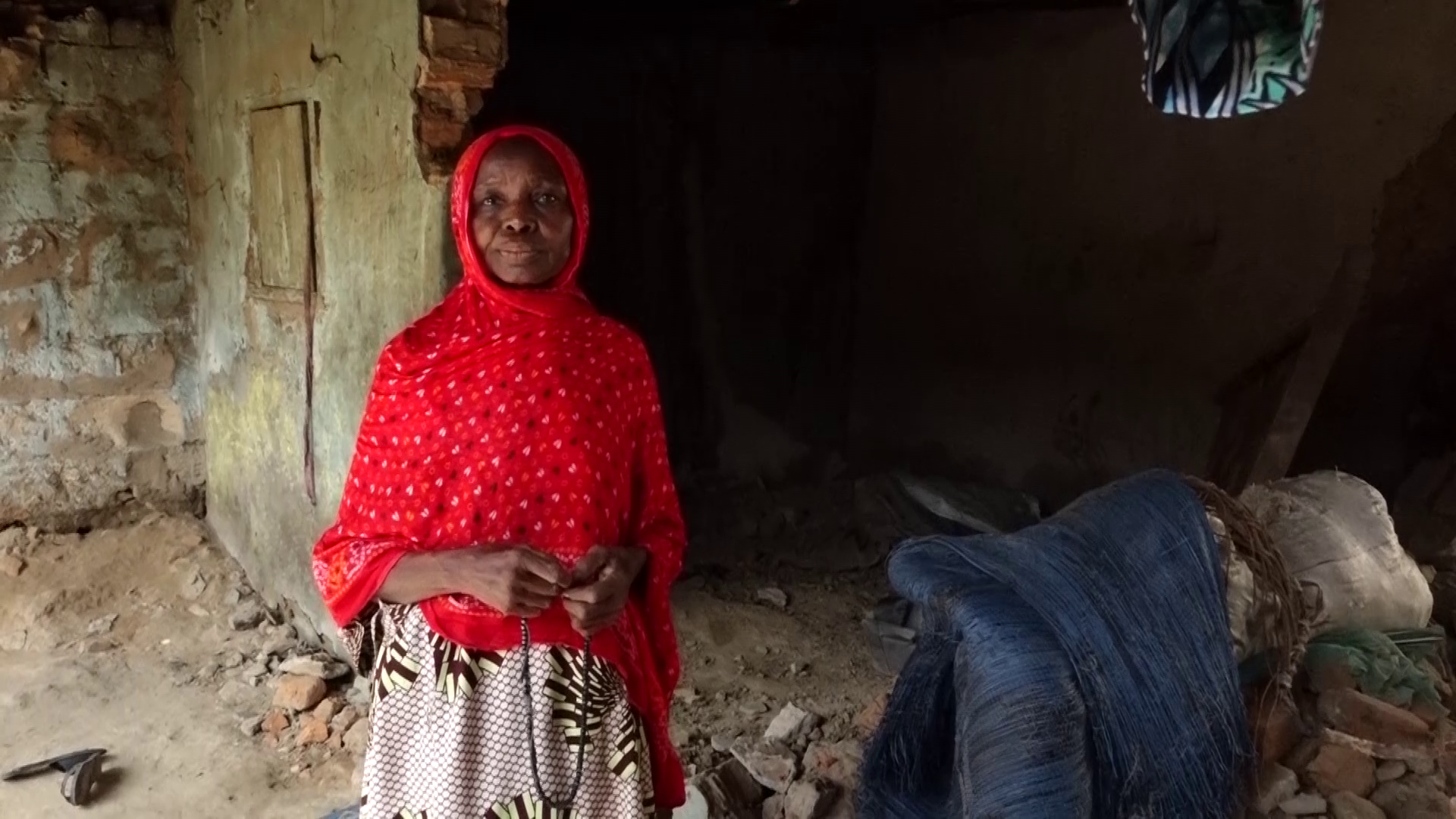
Fatima Mustapha standing amid the ruins of her home
The silent trauma of survival
There is no gainsaying that women and children compose the heart of the afflicted, bearing a unique burden of hardship. They are not only displaced from their physical homes but pushed from the fragile balance of survival. Arjun Jain, UNHCR’s representative in Nigeria, observed that the floods are a fresh wound upon open scars inflicted by years of displacement and conflict on affected communities. “Communities which, after years of conflict and violence, had started rebuilding their lives were struck by the floods and once again displaced,” he said.
According to the UNFPA’s 2022 estimate, about 6.7 million people – 80 per cent – of the 8.4 million people requiring humanitarian assistance in Nigeria are women and children and are in the three most affected northeastern states of Borno, Adamawa and Yobe. Compared to the previous year’s 8.7 million, this represents a slight four per cent decline in people in need of humanitarian assistance.
Within these population groups, some of the most vulnerable people with special needs are housewives and girls who, in some cases, face a triple burden of finding ways to survive, caring for their families and protecting themselves from sexual violence.
According to the Humanitarian Needs Overview (HNO) for 2022, an estimated 1.4 million individuals (46% IDPs, 23% returnees, 31% host communities) will require Gender Based Violence (GBV) prevention and response services in the affected states.
As the September flood recedes from the streets of Maiduguri and host villages (in Jere and Konduga) to the damaged Alau Dam, an unwieldy social crisis manifests in its wake, accentuating rising gender inequalities. The risk for women and girls multiply in real time, argued social worker, Omolara Odila.
“Women are more vulnerable during emergencies and are left to navigate hardships that men rarely face in the same way. Many of them are poor and the flood has rendered them even more vulnerable than most can truly comprehend.”
She argued that due to the widespread and systemic impoverishment of females in the disaster-prone areas, they are unable to adapt, without urgent and sustained help, to hardships foisted on them during emergencies, like the flooding that just happened here (in Maiduguri) other humanitarian disasters.
Odila maintained that women are also generally more traumatised and vulnerable to Sexual and Gender Based Violence (SGBV) and other personal safety and health challenges imposed by disasters and social inequalities between genders. “The higher incidences of SGBV may increase the number of deaths and diseases among women and girls,” she said.
Findings revealed that SGBV has surged within distressed communities, since the flood disaster. “Many child molestation and rape cases happen in the dark but they go unreported because the victims fear being shamed and stigmatised,” said Hussein Jaka Ahmedu, a haulage truck operator from Konduga. Corroborating him, his partner, Bintu Abdullahi, a grain merchant and supplier to several IDP camps in Borno, revealed that she and two of her staff recently rescued one nursing mother and her teenage half-sister from a gang of seven boys, equally displaced, who tried to rape them in exchange for food.
It would be recalled that four days after the Alau Dam collapsed, a Civilian Joint Task Force (CJTF) officer reportedly molested and raped a female survivor in the reopened Bakassi IDP camp. Speaking to the press, Bintu Mustapha, one of the flood survivors at the camp, also revealed that some members of the CJTF, a local security outfit complementing military onslaughts against terrorists in the northeast region, were diverting relief materials in favour of their girlfriends and friends.
Several females face the brutality of survival on multiple fronts, not only battling natural calamities but also the malice of males emboldened by the void of law and order. Health services are scarce; when available, they are stretched too thin to provide the care so urgently required. The risk of maternal mortality grows perilously high for expectant mothers, unable to access safe labour conditions amidst ruin.
The Humanitarian Needs Overview (HNO) indicates that 1.4 million people across the northeastern states need SGBV prevention services—an overwhelming burden on an already faltering system. “Every disaster disproportionately weighs upon the women, increasing the threat of sexual violence,” said Noemi Dalmonte of UNFPA. “The cycle of vulnerability persists, leaving these women no respite,” she said.
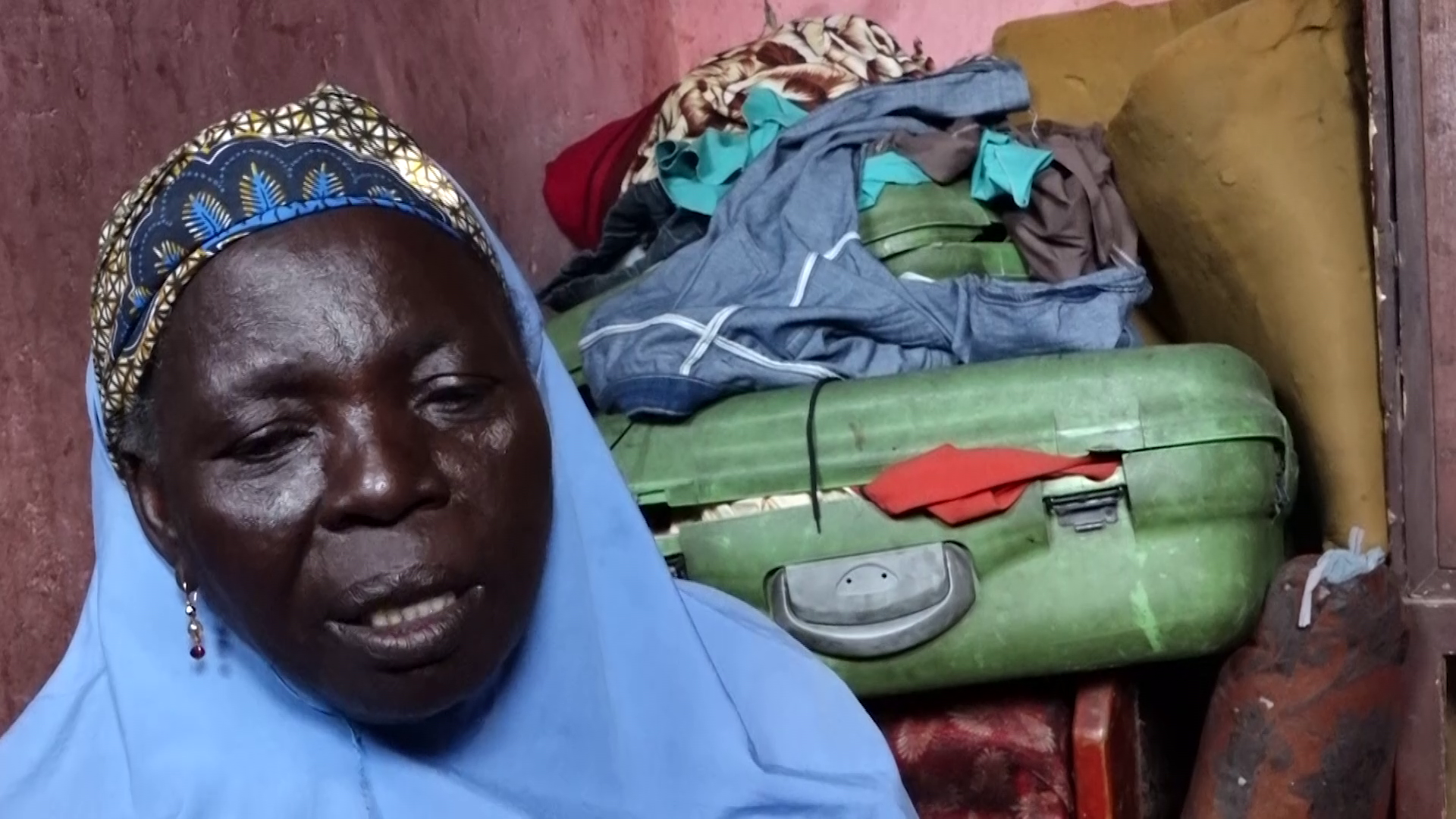
As mothers struggle, so do daughters too. With resources decimated, young girls often bear the brunt of domestic upheaval, compelled to forsake education to aid their families in ways few children should ever be asked. A fragile dream of school, torn apart by the rising tide, is left for the faint echoes of laughter and learning, replaced by the harsh responsibilities of survival. With schools damaged and community infrastructure gutted, their future remains anchored in uncertainty.
“I would love to return to school. I miss my friends and mistress (teacher),” said Ayisatu Da’ala from Mafa. The 12-year-old currently begs to survive on the streets of Maiduguri, alongside her mother and maternal aunt.
Impact on female health
Experts opine that recurrent and costly disasters related to climate change affect in no small measure, the social and health determinants of female wellbeing. Floods could damage critical infrastructure, including health and learning institutions. Damaged infrastructure also impedes access to health resources. Pregnant women, for example, could be at a higher risk, thus leading to a rise in maternal death.
Flooding, conflict and other humanitarian crises have only worsened the pre-existing severe reproductive health and GBV situations. The 2018 Nigeria Demographic and Health Survey (NDHS) reports the highest rate of sexual violence in the northeast of 16%, compared to 10% or less in other regions. Data from the 2018 NDHS also shows that the northeast has a high unmet need for contraceptives at 17% and an extremely low contraceptive prevalence rate of 2% compared with the 10% national average – which translates into a high total fertility rate of 6.3 as compared to the national average of 5.5. The region also has a very high Maternal Mortality Rate of 1,546 per 100,000 live births as compared to the national value of 546 per 100,000 births.
Teenage pregnancy is also high at 32%, a major health concern because of its association with higher morbidity and mortality for both the mother and the child. The crisis with the health system disruption has further aggravated the situation. Only 22% of deliveries are assisted by a skilled birth attendant, exposing women and newborns to increased risk of death and complications.
In flood-ravaged parts of Borno, humanitarian needs remain critical and inaccessible to women and children, among other vulnerable segments of the displaced residents. Despite the significant reduction in the number of displaced people living in emergency shelters, from a peak of over 400,000 people at the height of flooding to about 50,000 registered individuals as of October 4, according to the Borno State Government’s Emergency Operations Centre (EOC). An additional 700,000 people also sought shelter with relatives during the flood emergency, according to authorities.
In addition to population displacement, there are pressing public health concerns as many women learn to live in overcrowded and unsanitary IDP camps – without access to clean water, toilets and bathrooms, and emergency healthcare. Their desolation is further accentuated by the recent declaration of a cholera outbreak with over 300 deaths.
Many women hitherto reliant on their missing or now incapacitated husbands and children, suffer social exclusion and discrimination that limits them from education, employment and other social benefits. The flood and displacement have also aggravated food insecurity among unemployed female segments of the displaced population. Prices of food staples, sanitary towels, and other essential provisions have increased due to hoarding and inflation. Humanitarian aid delivery has also been significantly affected due to the lack of access to flood-devastated areas. Thus assistance is less likely to reach all those in need and more likely to exclude women, particularly where modalities have shifted to distribution via IDP camp chairmen further exacerbating the social inequalities that trigger lack of access of several women to urgent relief materials.
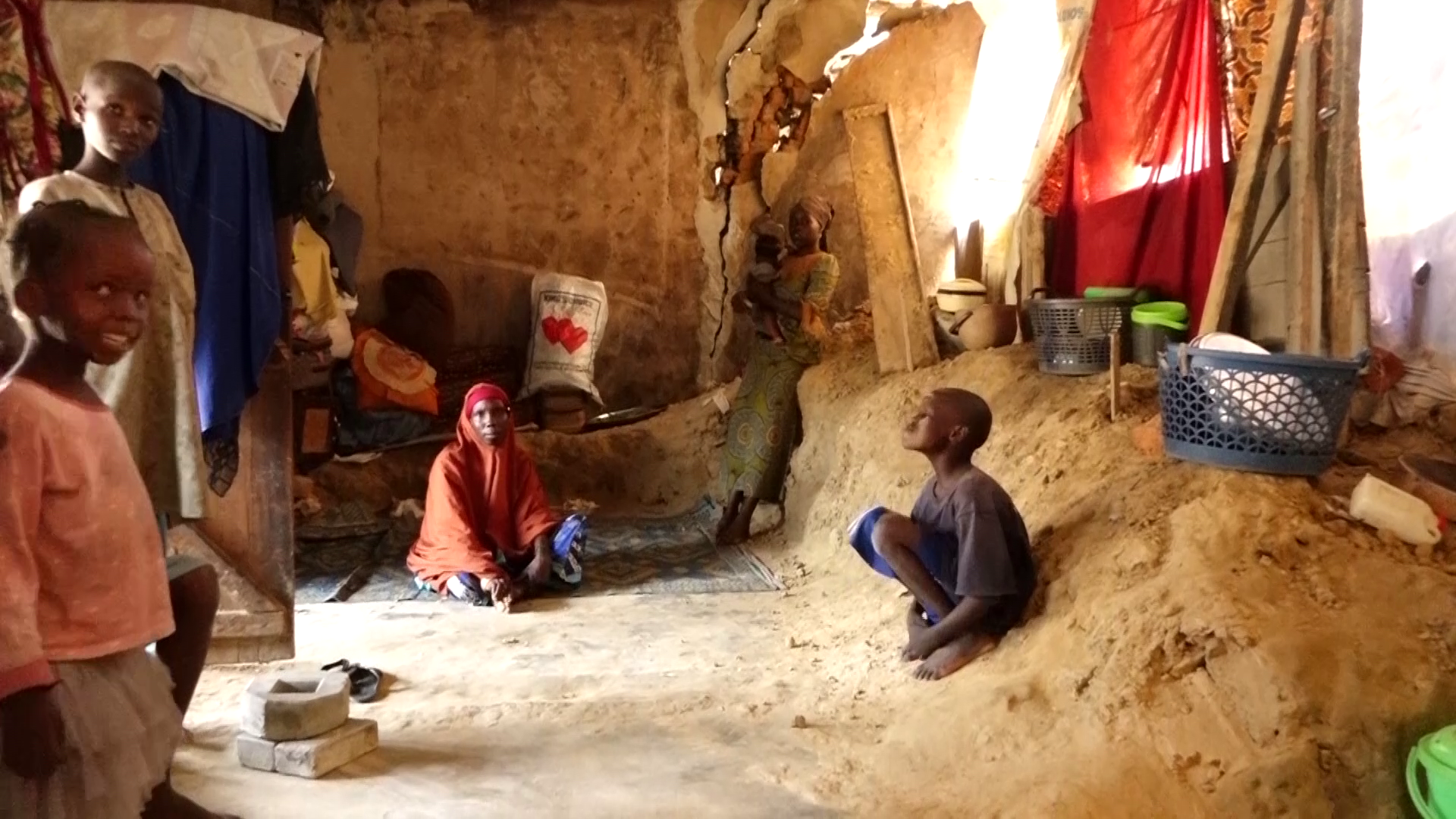
Fragments of hope
Priorities for immediate intervention among flood-affected communities in MMC, Jere, Konduga and Mafa LGAs include water and sanitation hygiene (WASH) items as well as sanitation facilities to restore dignity and safeguard health, borehole rehabilitation, disinfection, and other water supply measures.
On October 4, the Borno Secretary of State Government (SSG), Alhaji Bukar Tijjani, who is also the head of the newly established Expanded Flood Relief Committee convened a coordination forum on flood response with humanitarian partners. The SSG presented a report ‘The Impact of Protracted Insurgency and Recent Devastating Flood Disaster in Borno State, which indicated that 85,000 homes were damaged in 19 wards in the Greater Maiduguri area [MMC, Jere and Konduga LGAs] based on BSG assessments. Ongoing coordinated assessments with humanitarian partners will further inform humanitarian and development partners’ planning and programming in both temporary sites and affected wards.
According to the report, local businesses, particularly those dependent on agriculture, livestock and trade have been hit hard, with recovery at a slow pace amid a deepening food security and nutrition crisis and a public health emergency.
While the flood waters have receded in MMC and Jere, flooding continues to affect other parts of Borno State. In Dikwa LGA, over 27,000 people, many of whom have lived in protracted displacement, were displaced once again due to torrential rainfall, windstorms, and overflow from the Alau Dam and the Yadzaram River in September. Initial flooding affected 12 internally displaced persons (IDP) camps, with five completely submerged, and impacted three host communities.
To mitigate the consequences of violent conflict and increasing inequalities on women and girls, Amina Goni, an emergency social worker and consultant, advised that the state government must partner with humanitarian actors to create more inclusive community platforms, giving voice to women, people with disabilities, the elderly and other marginalised groups. Addressing stress and anger management in communities is also essential for reducing conflict. Collaborating with community and religious leaders on local health and communications campaigns could help address public health concerns and curb palliative diversion, she added. “Additionally, to ensure transparency of recovery efforts, the government must support civil society to track resource distribution while adapting livelihood programmes to aid women, girls, and the disabled in economic recovery,” she said.
Of dreams and dowries: A tidal wave of grief
With the floodwaters receding from Maiduguri and affected villages, women in Borno —already the most vulnerable due to years of displacement and economic hardship—are once more called to survive on sheer willpower. Those that survived the ravage of September; from the rivers that slithered and hissed, like wrathful serpents, to shattered homes and health risks, are left to battle alone for their safety, their dignity, and the lives of their children.
For the women left with nothing, those whose sons and husbands would never return, there is no justice to seek, only feeble hope and survival. Helen Samaila, for instance, has been wallowing in misery since her husband disappeared with the floodwaters. The possibility of his demise is a chasm of dread that she would not cross. Yet as the days slip by, she must help her six children come to terms with the truth: that their father who once provided, the husband who was her rock, might never come back.
Mothers, like Halima Mohammed, weep for the memories their missing sons left behind, for the clothes their daughters had saved for festive days – all stripped from their lives in an instant. Mohammed dreams of Ali’s return, but deep in her heart, she dreads that he might never come back.
For survivors like Zulai Bukar, the flood swallowed treasured symbols of identity and tradition. Part of her dowry, a bead necklace saved over the years got washed away with her family heirloom, leaving a cavernous emptiness where cultural pride once resided. Mustapha mourns not just the home she has lost, but the memories tied to each room.
In the aftermath of the catastrophe, grief clings to the survivors like the muddy residue of the floodwaters. The deluge has rendered them destitute not just in pocket but in spirit, robbing them of the humble independence they once nurtured. There is no path forward, no farmland to till, no petty trade to ply, no food to eat – many women are thus adrift, clinging to the debris of their former lives.
Where they once found purpose in keeping their families whole, they now wander the wastelands of grief, struggling to find footing in a world stripped of softness.
Yet, for the women of Maiduguri, survival is a burden as much as a blessing; while each day is a stark reminder of all they have lost, it also reminds them of the lives they must fulfil.
In the depths of her despair, for instance, Fatima Mustapha counts her tasbih every obligatory salat – spreading her frail hands to the heavens, she seeks provisions denied her and thousands of women by a lack of government presence in their lives.
Environment
It smelled like death: How flood disaster erase Borno’s blind elderly
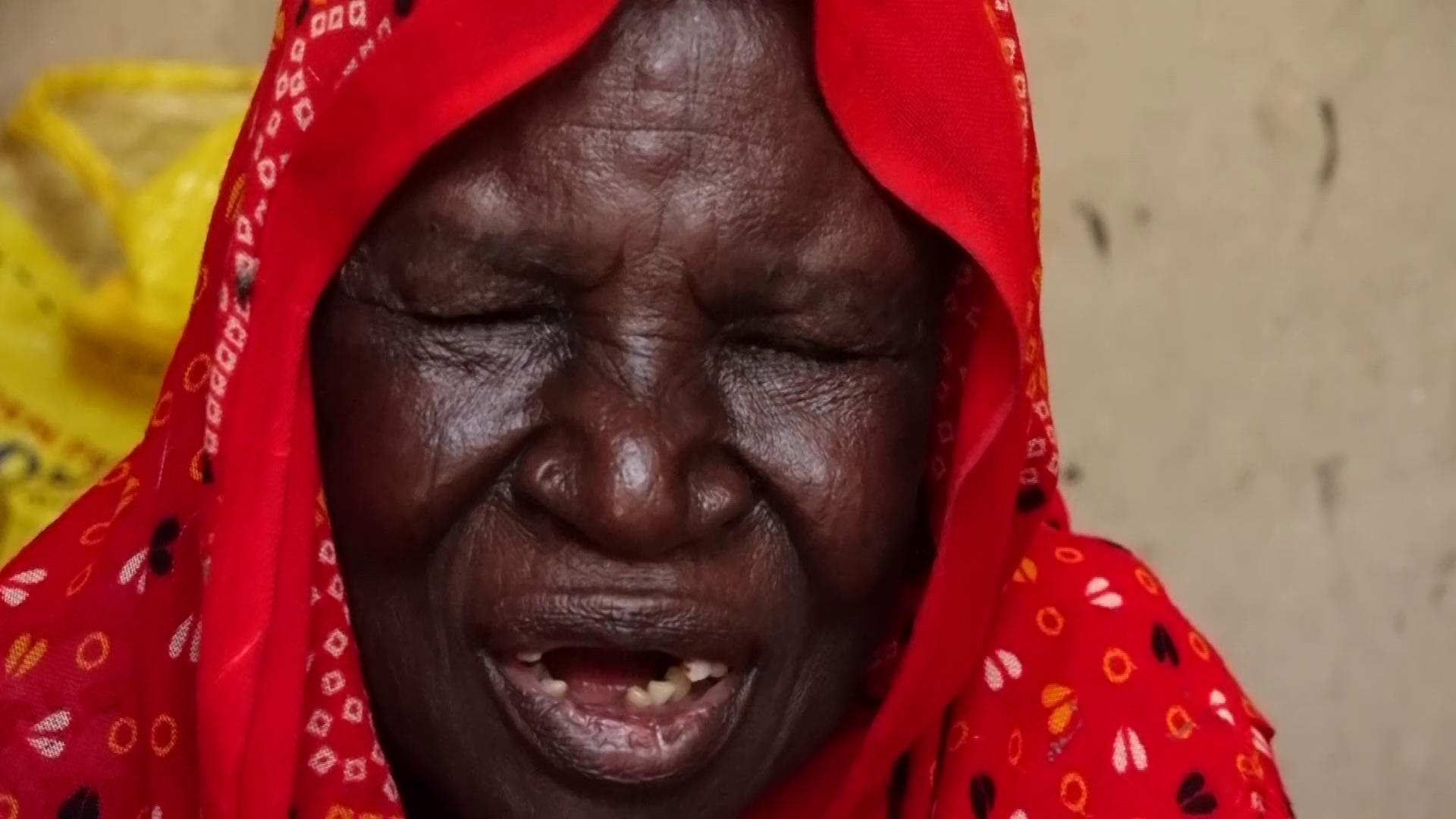
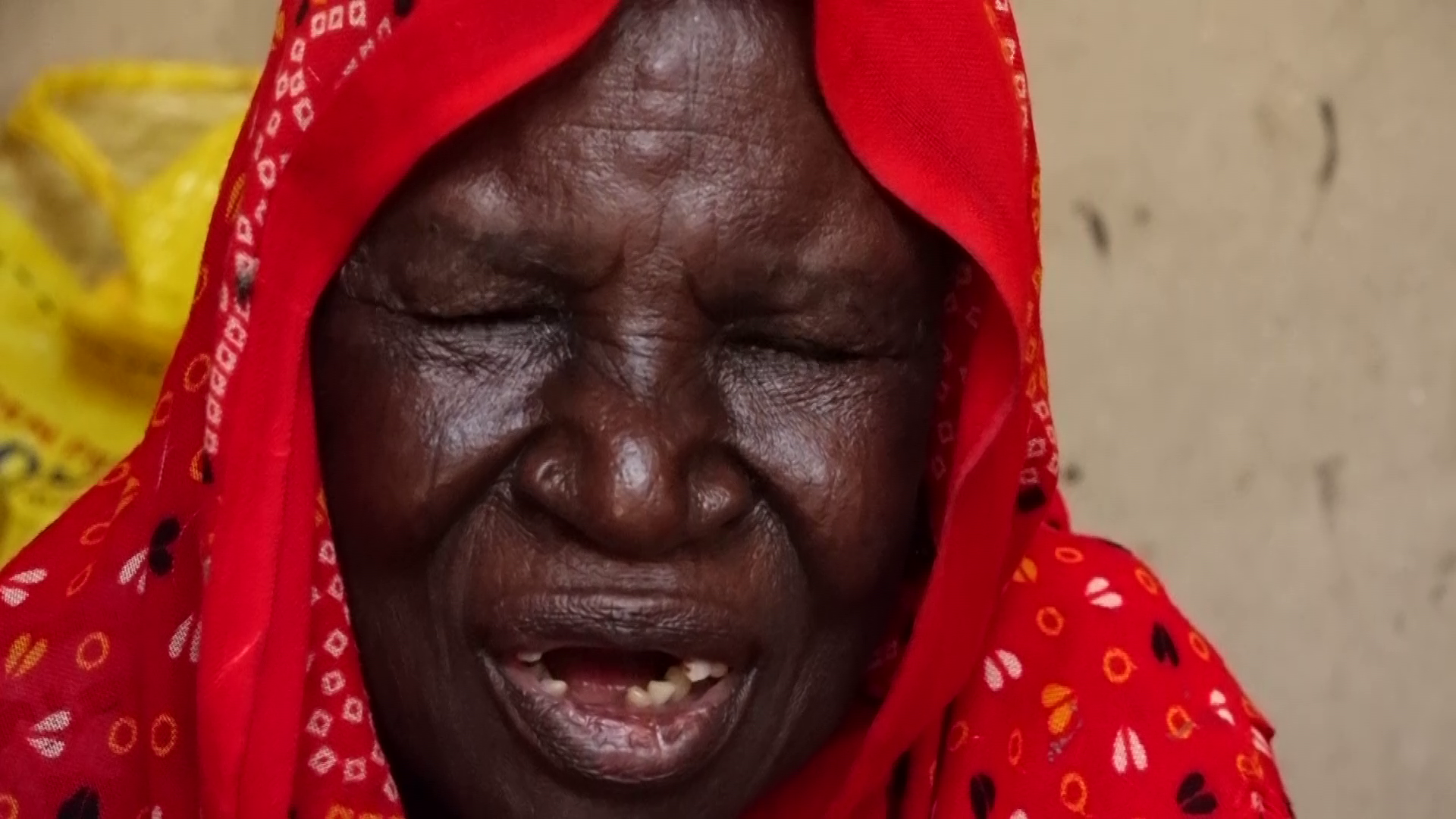
- In belly of the beast: Haunting reality of Zara Aji, others’ amid Maiduguri’s reptilian waters
- As waters recede, PWDs wander through a world they cannot see, that will not see them
- Betrayed by policy, drowned by nature: Non-inclusive laws leave PWDs gasping for survival
By Olatunji OLOLADE, Associate Editor
The flood stole silently at first, slithering through the streets of Gwange like a reptilian beast. Until it got to Zara Aji’s home. By the time Aji stirred in her bed, she was soaked to the pants. The Alau Dam had collapsed hours before, spilling with nature’s pent-up rage. It was 3 a.m. when the water began its slow, fearsome crawl into her abode.
The cold splash from her feet up to her midriff startled her fully awake, but her blindness kept her trapped in a black sea of panic. Aji could hear the roar of the waters outside, and its chilling hum inside her room. She sat, helpless, dreading the rising tide of doom. At 83, her body was frail, her sight stolen by the passage of time. As the flood rose to her waist, the house groaned around her, listing to the weight of the water gushing in from every crack and crevice. The room was no longer hers but a watery tomb. And yet, in that critical moment, salvation came in the form of her grandson’s love.
Mohammed, having heard the chilling hiss of the flood as it licked the edges of their compound, was up in an instant, wading through the house, daring the surge in search of his granny.
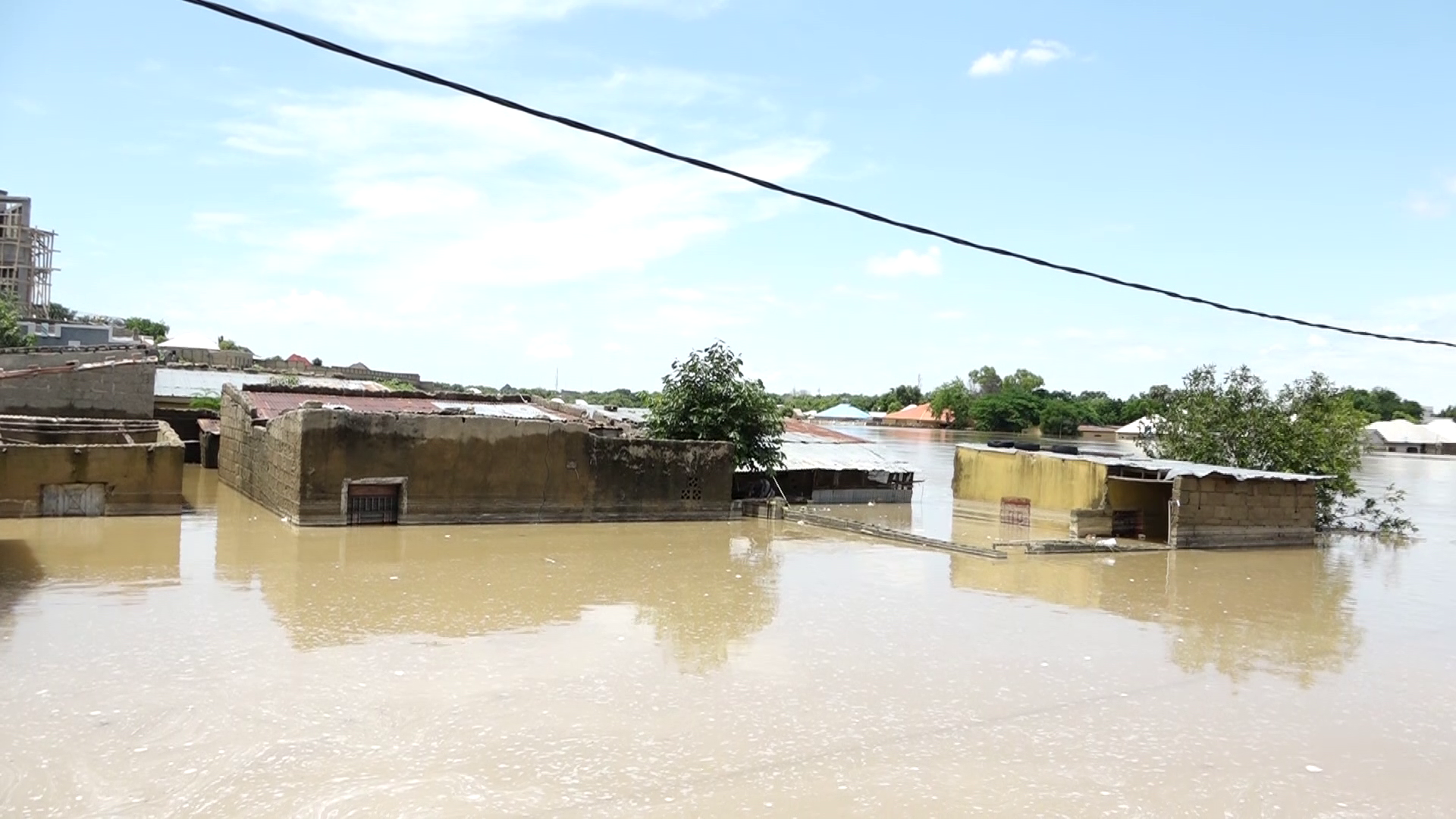
A debt of love carried through cold waters
Mohammed found Grandma Aji shivering in bed. Instantly, he lifted her frail body onto his back. The weight was light, but the task heavy, but the teenager waded through the depths of the flooded house, each step a battle against the current that sought to pull them both under.
Tears slid down Grandma Aji’s cheeks, as she clung to her grandson, the poetic resonance of the moment sinking into her heart. In that moment, he was no longer the toddler she rocked to sleep on her back, singing soft lullabies. The roles were reversed. The grandson was now the saviour and protector, bearing his grandma to safety through dangerous waters.
Aji could feel the waters splashing against the boy’s chest. She could hear him grunt as he fought to keep them moving. And in the darkness, as the deluge threatened to take everything from them, there was a strange, haunting beauty in the way love had come full circle.
Mohammed hastened out of the house before its walls crumbled. There was no turning back. The water seemed endless. But they moved through its depths, slowly but steadily towards London Chikki. The journey was treacherous, but the boy didn’t falter. He held tightly to his grandmother, knowing that in that moment, he was carrying more than just her frail body—he was bearing a lifetime of memories, of love, of shared history.
Into the shallows, but not to safety
They sought refuge in the London Chikki area, but the flood had not spared it either. The waters were still rising, the current still swirling to pull them both under. “We walked again,” Aji recalled, her voice frail with grief and exhaustion. “We walked until we reached the main road.”
For three days, they stayed on that road, waiting for the waters to recede, like so many others whose lives had been uprooted by the flood. They watched the sky for signs of hope, but none came.
Hunger gnawed at their stomachs, and the cold seeped into their bones. They were far from safety, but at least they had survived.
Eventually, they sought refuge with Aji’s brother, who took them in until the waters receded.
As the floodwaters receded, the destruction left behind was staggering. What they returned to was not a home but a hollow shell of what once was. Aji’s home was gone, reduced to a pile of broken walls and sodden memories. Her clothes and few possessions had been swept away in the torrent, leaving her destitute.
“The government didn’t provide anything for us,” she said, her voice carrying the weight of betrayal. “We heard there was support, but it never came to our community.”
The flood had claimed so much—her home, possessions, and sense of security—but at least it had not taken her.
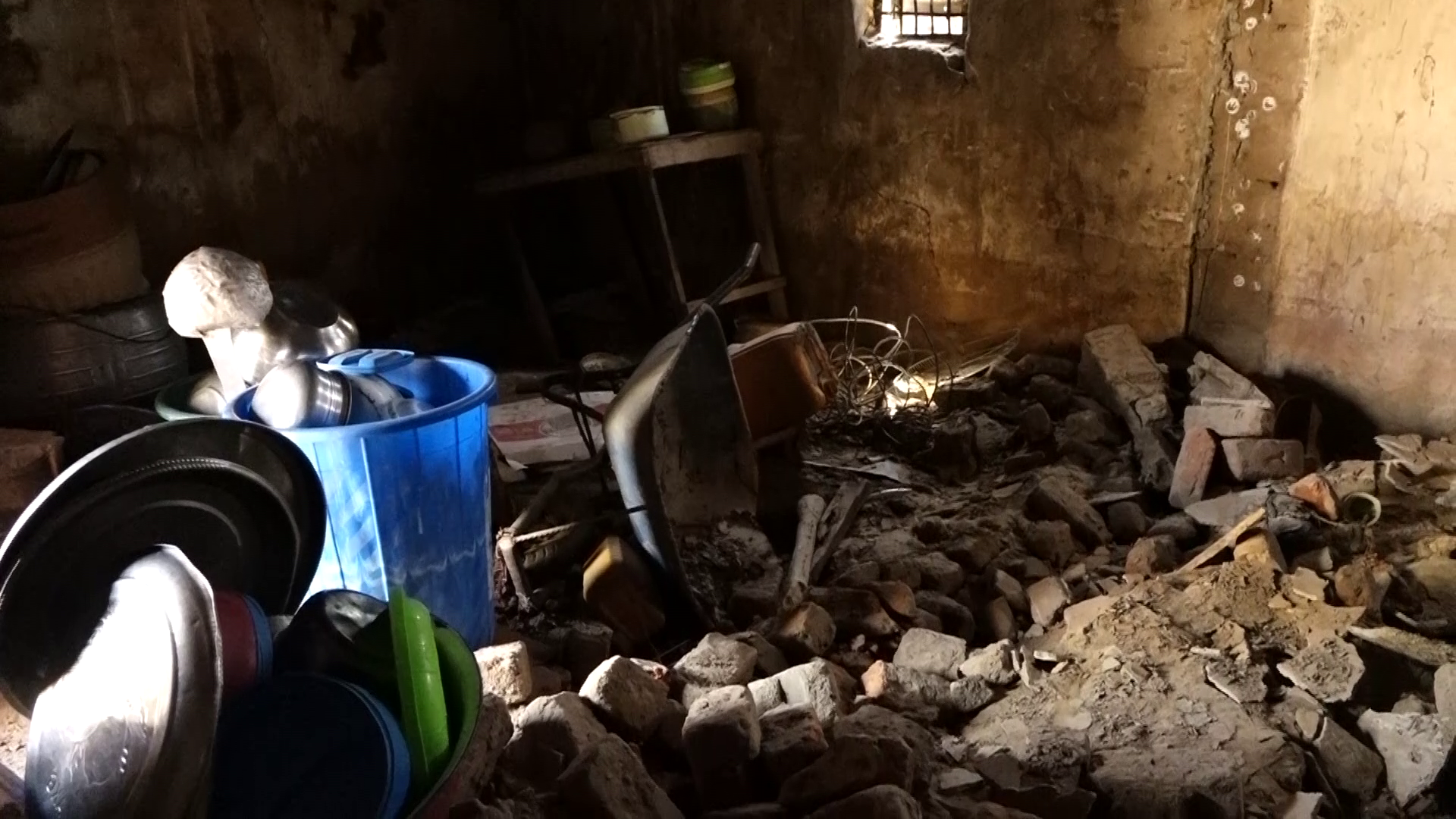 The flood destroyed visually impaired Zara Aji’s home, leaving in its wake a pile of rubble.
The flood destroyed visually impaired Zara Aji’s home, leaving in its wake a pile of rubble.
Lost in the torrent: Stories of the invisible
Aji’s experience is one among several narratives of persons with disabilities (PWDs). And they all resonate with a deafening chill. For most elderly PWDs, the flood was not just a natural disaster but a test of survival against unimaginable odds. As the waters rose and people fled, PWDs who could not see the danger approaching, were left behind.
Not all were so fortunate, like Aji. On the same night that her grandson rescued her, Safinatu Bala and her friend, Seyidatu, got lost in the waters. Widows both, the two women reportedly lived side by side in Gamboru, their lives intertwined by friendship and a shared hardship of visual impairment.
When the flood came, they clung to each other, and wailed for their neighbours to rescue them from the fury of the rising water. But in the chaos, they got separated and swept apart. By morning, neither woman could be found. No one knows if they are still alive, groping around some distant tree or rock, or if they had succumbed to the flood’s cold embrace.
On his part, Iliyasu, an 84-year-old visually impaired and internally displaced person (IDP), told his fellow PWD and co-squatter around the Monday Market, in Maiduguri, to leave him. “I have lived through too many floods. I will survive,” he said. “But if this is to be my end, then so be it.” His words were a stark reminder of the quiet desperation that clung to several PWDs amid the deluge. Like Bala and Seyidatu, Iliyasu hasn’t been seen since September 10.
For many PWDs in Maiduguri, the flood was a cruel reminder of their vulnerability. They could not see the rising waters, or gauge the danger until it was too late. Volunteers and aid workers, in their rush to evacuate the able-bodied, overlooked those who could not flee on their own, noted Zulfatu Adamu, a Maiduguri-based aid worker. And so, the blind and disabled were left behind, their cries for help drowned out in the snarl of the flood.
Alau Dam: The collapse that unleashed a torrent of sorrow
The flood that swept through Maiduguri and the surrounding areas was not an act of nature alone. It was the result of years of neglect and mismanagement, of warnings ignored and repairs postponed. Thus on the night of September 9, 2024, after days of torrential rain, the Alau Dam finally gave way, its weakened structure crumbling under the weight of the water.
At the dam’s collapse, Maiduguri experienced its most severe flooding since 1994. Severe flash flooding submerged the Maiduguri Metropolitan Council (MMC) and Jere Local Government Area (LGA), displacing hundreds of thousands of people, including PWDs, at the height of the agricultural lean season’s food and nutrition crisis.
In a statement titled, “Flooding Alert for River Bank Residents,” the Commissioner for Information and Internal Security, Prof. Usman Tar, called for the immediate evacuation of affected areas, and urged residents to follow designated evacuation routes for their safety. However, a major blindspot of Borno’s rescue plan was the safe evacuation of PWDs in the flood prone areas.
When the waters surged, the rush to evacuate became a race against death. For most, it was a panicked dash through roads slick with mud, toward whatever safety they could find. The waters ravaged villages, farmlands, and human lives alike—but hidden in the narrative of loss was the quieter, deeper anguish of several elderly PWDs. For blind PWDs like Aji, Bala, Seyidatu and Iliyasu, the flood was a manifestation of their deepest fears.
Visually impaired, their world had always been one of shadows, but the deluge brought with it an unprecedented darkness that they could not navigate. In the chaos, they were left behind, like mere shadows on the periphery of a frantic exodus.
Bitter streets, bitterer shelter
As the deluge persisted, survivors sought refuge at emergency shelters, filled to capacity. “Before the flood, I lived with my niece. She invited me to squat in her home after her husband died. On the night that the flood destroyed our home, I couldn’t sleep easy. I woke up and everywhere smelt like death. But it was the flood, and it almost drowned me and Rekiya (one her niece’s kids). We fled and now have to live on the streets. We depend on alms to survive,” lamented Fatima Yagana. The 74-year-old visually impaired widow, having been rendered homeless and destitute by the flood, now lives on the streets with her niece, Ayisatu, and the latter’s two kids because they couldn’t stay at the Gwange 1 emergency shelter due to the unsanitary conditions.
The crowded shelter, like so many others, offered no sanctuary. Forced to live within the squalor, the stench of human waste clung to the air, rendering the already unbearable heat suffocating. “The toilets smelt really bad,” Yagana lamented. Deprived of sight, her only solace was the breath of air she could steal from the shelter. So, the 74-year-old chose the streets—preferring the rough ground and open sky to the claustrophobia of an unsanitary refuge.
Yet on the streets, hunger stalked her and her niece’s children like a wolf at their heels. The flood had not only taken their home but stripped them of any dignity they once had. Handouts became their only means of survival, each day a bitter fight for morsels of food, each moment a testament to the indignity of abandonment.
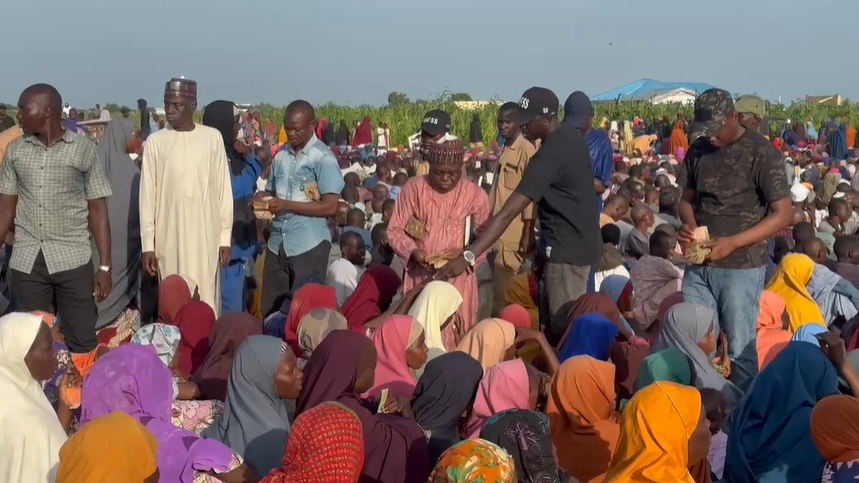
A humanitarian void
The Borno State Government, alongside humanitarian agencies, scrambled to provide aid. Yet, amid the efforts to register and assist the displaced, the specific plight of PWDs slipped through the cracks. In total, more than 2,500 people with disabilities in the flood prone areas were directly affected by the flood, many of them left stranded in their homes as the waters rose, with over 150 missing or presumed dead, according to the National President of the Joint National Association of Persons with Disabilities (JONAPWD), Abdullahi Ali Usman.
The figure quoted by Ali Usman is no doubt a conservative estimate. It would be recalled that precisely 3,127 PWDs comprising turned out in Maiduguri, to receive the N30,000 grant disbursed by Governor Babagana Umara Zulum, in 2019, as part of of the social protection scheme of his administration.
Going by the 2019 figure, the number of PWDs reportedly affected by the September flood, therefore, doesn’t represent the full picture.
The affected PWDs were not invisible, but rather ignored—denied access to the evacuation routes and the dignity of urgent care. The stark numbers—37 deaths, 58 injured, 414,000 displaced—are a cold, clinical testament to the devastation. But beneath these statistics lies a deeper wound, one cut by marginalisation and neglect. “Already PWDs are facing marginalisation due to their disabilities, this flood disaster is a double blow for them,” lamented Ali Usman.
Corroborating him, Abiodun Tilawe, a social psychologist and emergency aid consultant stated that, “Persons with disabilities are usually at greater risk in an emergency. More worrisome, she argued, is the fate of older PWDs with mental health conditions. “They are at a higher risk of death as the hardships experienced impact devastatingly on their mental health. Many become traumatised by the fear of losing their lives and being left behind. From experience, older PWDs find it difficult to adapt to the extreme conditions into which they are suddenly thrust. Before the disaster, they are not taught about what to do to adapt and keep themselves safe. Some of them, who were displaced from their communities by protracted conflict, lived on the streets without any caregiver. Since the flood happened, they have been unaccounted for, and nobody has bothered to look for them,” said Tilawe.
Torrents of trauma: A visceral reality
For PWDs who survived, each day in the aftermath of the flood has been an agonising reminder of their vulnerability. The disaster stripped them of their already fragile autonomy. The very essence of disability is a barrier to mobility, access, and dignity—now amplified by the unrelenting ravage of nature.
For Jelani Aliyu, life as a PWD at the Gwange 3 temporary refuge, became extremely difficult. Confined to a wheelchair, the 81-year-old revealed that the damage done by the flood made accessing every basic necessity an impossible feat. According to him, the emergency shelters were not designed for PWDs. The aid distributions were chaotic – the strong elbowed out the weak, and the disabled were left to mope on the fringes. There were no ramps, no accessible toilets, no accommodations made for people like him. He was invisible.
Yet if nature’s fury alone were not enough, the ongoing conflict in the region cast an even darker shadow over the lives of PWDs. In 2014, in the town of Damasak, Mohamadou, a blind man of 53 years, fled from his home as Boko Haram laid siege to his community. Blind and defenseless, he clung to his wife and son as they swam across the treacherous Yobe River, ducking a volley of gunshots from the rampaging terrorists. “We swam like fish,” he recalled, though he could not see the river that threatened to claim his life.
For two years, Mohamadou lived in a refugee camp, dependent on the kindness of his son and strangers. But his disability marked him as prey. In the lines for aid, his young son was frequently shoved aside by stronger, older men, and time after time, he returned empty-handed.
“I would wait in line with my young son to get aid, but adult refugees would kick children away, including my son. We were too weak to fight back and would often lose our turn and return without getting anything from the distribution,” he said.
Mohamadou, like so many PWDs displaced by both flood and conflict, became a ghost—present but unseen, alive but uncared for.
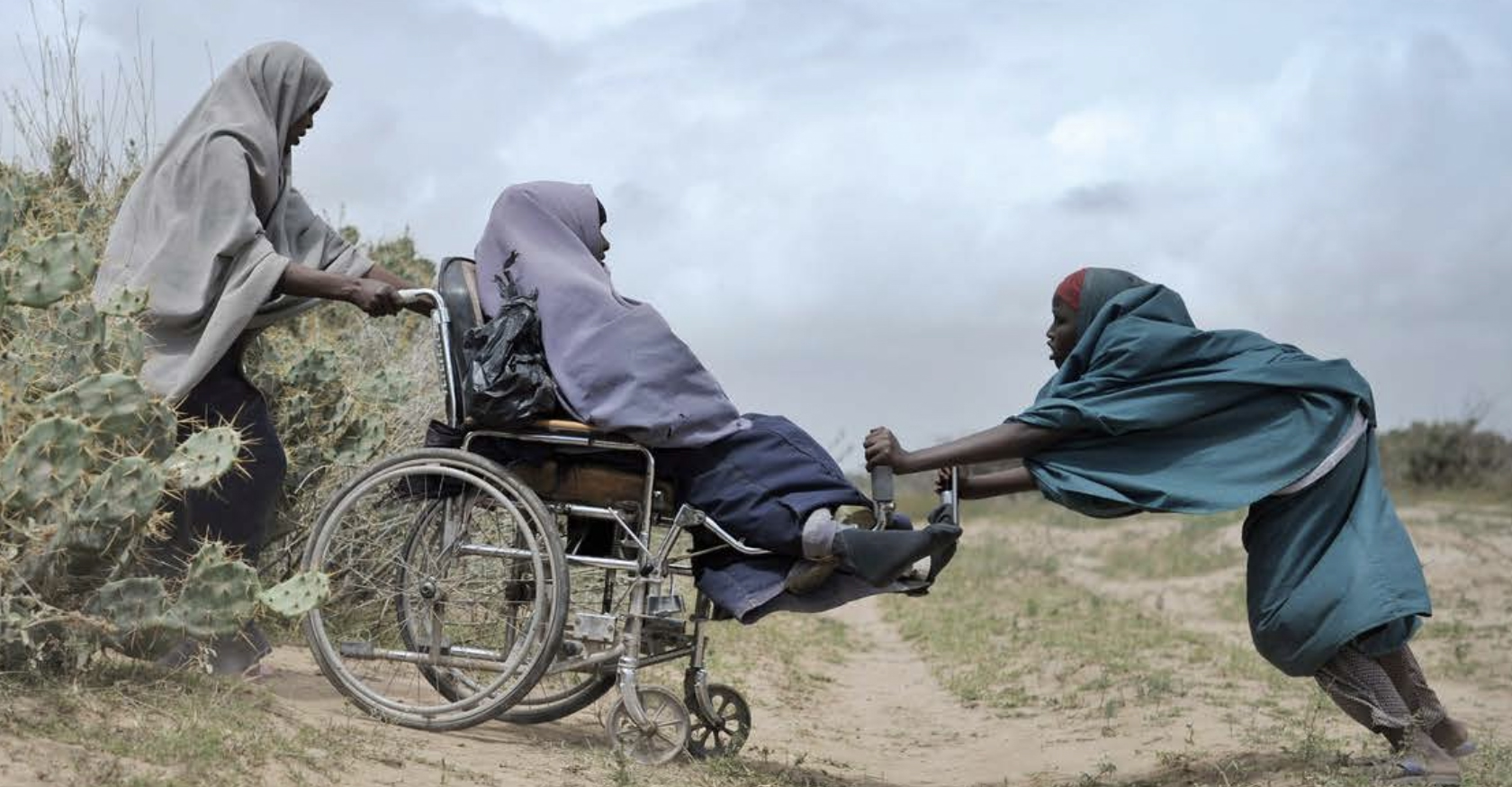
It’s a hard life for PWDs
Nigeria was affected by the worst floods in a decade between June and November 2022, according to the Internal Displacement Monitoring Centre (IDMC). The floods triggered over 2.4 million displacements, the highest disaster displacement figure in sub-Saharan Africa in 2022. Half of the displacements were reported in the southern state of Bayelsa in the Niger river delta, but Anambra and Kogi were also heavily affected. Displacement camps in the north-eastern state of Borno were also flooded, forcing thousands of people already displaced by conflict and violence to flee again. By comparison, floods triggered 166,000 displacements in 2023, a figure in line with the average of the past decade. By the end of 2023, 81,000 people were still living in internal displacement due to disasters, a more than ten-fold reduction compared to the end of 2022.
Disaster displacement, whether triggered by cyclones, wildfires, floods, or other hazards, is a growing global issue with particularly harsh consequences for PWDs, who have to endure heightened risks due to discrimination and barriers in accessing essential services.
In 2020 and 2021, the UN noted that older PWDs may encounter unique challenges during climate-related disasters, such as the Borno flood. Similarly, a 2021 report by Women in Displacement (WID) revealed that 27% of IDPs in northeast Nigeria have a disability—a figure that has increased since the insurgency. As a result, PWDs living in camps are disproportionately affected, and frequently excluded from key interventions.
According to the WHO’s 2018 World Disability Report, many PWDs in Nigeria, are disproportionately affected in a disaster, emergency, and conflict situations due to inaccessible evacuation, response, and recovery efforts. The WHO notes that they are more likely to be left behind or abandoned during evacuation in disasters and conflicts due to a lack of preparation and planning, as well as inaccessible facilities, services and transportation systems.
During floods, older PWDs would require greater assistance and additional time to evacuate, but they receive less support. Further findings revealed that most IDP camps are not accessible and people with disabilities get turned away from the emergency shelters, oftentimes, due to a perception that they need “complex medical” services. Consequently, older PWDs find themselves at greater risk as they are more likely to suffer medical conditions – such as heart or respiratory conditions – through extreme situations, according expert opinion. Older PWDs may also take medications that cause intolerance and impair the body’s response to cold and heat. The staggering death rates of people with disabilities and older people during the 2021 heatwaves in British Columbia (BC), Canada, illustrates these points: 91 percent of those who died had a chronic medical condition or a disability and 90 percent were older people.
Due to the lack of accurate data, it is often unclear exactly how many people with disabilities and older people are affected by a particular disaster as indicated by the Borno flood. The lack of accurate data on the number of IDPs living with a disability and their location equally poses challenges to monitoring their needs and allocating resources. It also makes it difficult to tailor support and assess the inclusivity of responses over long term recovery and reconstruction efforts.
About a billion people, or 15 per cent of the globe’s population, are estimated to have a disability, of whom 80 per cent live in low- and middle-income countries, according to the Internal Displacement Monitoring Centre (IDMC). The global number of people with disabilities is increasing, partly because of ageing populations and a rise in chronic health conditions. It is not known how many people with disabilities live in IDP camps associated with disasters. The IDMC estimates that 5.1 million people were still displaced as a result of disasters at the end of 2019, but this figure is highly conservative. This is because data on the number of people living in displacement after a disaster event is scarce.
Accessibility issues, stigmatisation and variations in definitions tend to render IDPs with disabilities invisible during data collection. They are, as a result, often under-identified. For example, when Ambae Island in Vanuatu was evacuated in 2017 because of increased volcanic activity, there were concerns that a significant number of people with disabilities had not been identified among the evacuees. The International Organization for Migration’s Displacement Tracking Matrix (IOM-DTM) reported 37 people with disabilities out of 5,125 people located in one evacuation centre. This represented less than one per cent of the total displaced population. Sources vary on the prevalence of disability in Vanuatu, but 2019 data from the UN placed it at up to 12 per cent.
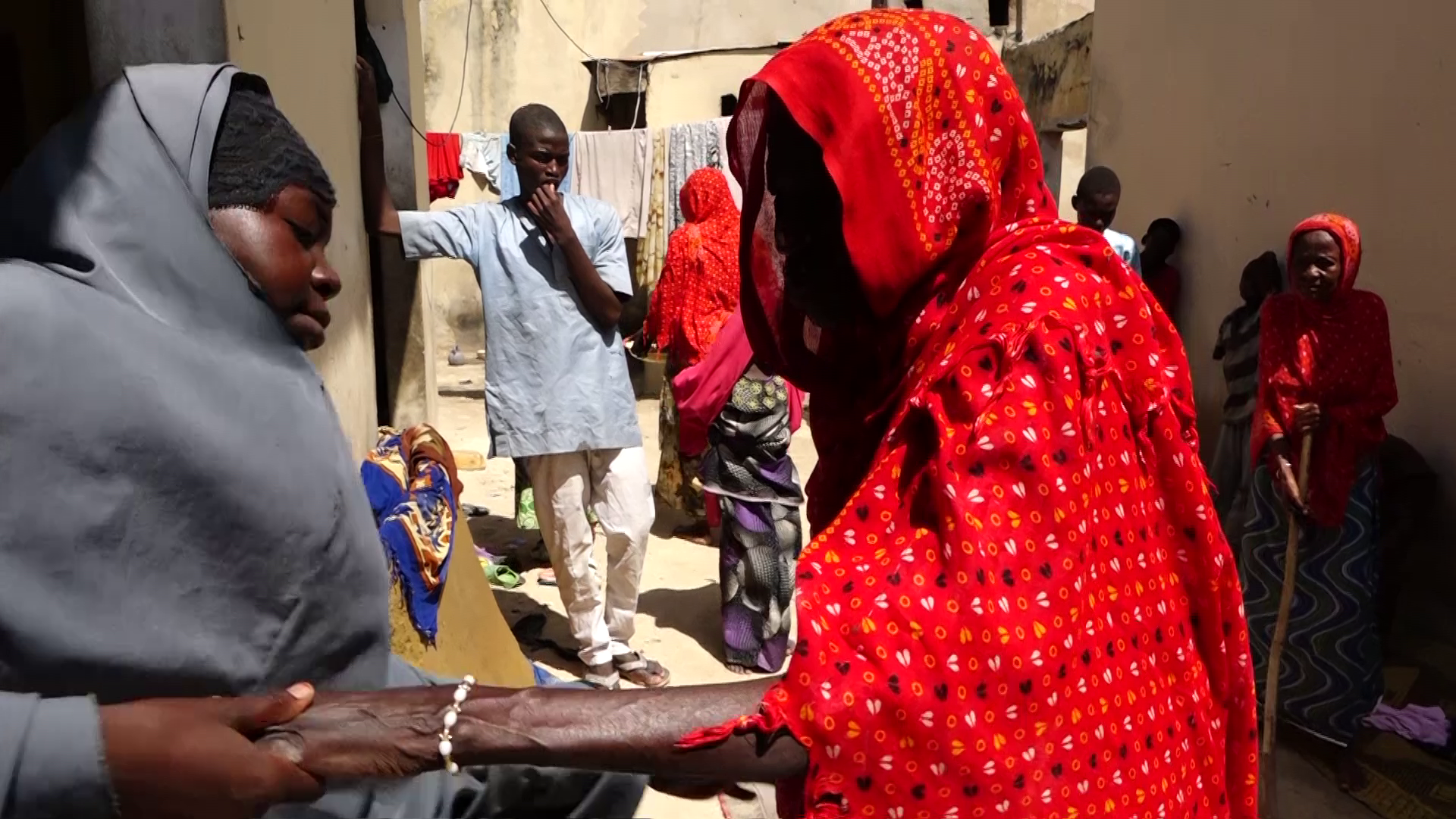
Disability Bill: Rosy in print, pale in execution
On January 23, 2019, Nigeria’s former President Muhammadu Buhari signed into law the Discrimination Against Persons with Disabilities (Prohibition) Act, 2018, following nine years of relentless advocacy by disability rights groups and activists.
The law prohibits discrimination on the basis of disability and imposes sanctions including fines and prison sentences on those who contravene it. It also stipulates a five-year transitional period for modifying public buildings, structures, and automobiles to make them accessible and usable for people with disabilities.
The law also established a National Commission for Persons with Disabilities (NCPD) in 2020. The NCPWD, tasked to guarantee PWDs access to housing, education, and healthcare, is also empowered to receive complaints of rights violations and support victims to seek legal redress amongst other duties.
Yet, one thing the NCPWD hasn’t done is to ensure the protection of Nigerians with disabilities during a natural disaster, emergency or conflict.
Lack of data, conflicting PWDs figures accentuate social
exclusion
Quoting recent World Health Organisation (WHO) figures, the immediate past executive secretary of the NCPWD, James Lalu, disclosed that currently, there are over 35.1 million persons living with disabilities in Nigeria of which a paltry 4,000 are duly registered.
Notwithstanding, his successor and incumbent executive secretary of the Commission, has reiterated the NCPWD’s commitment to ensuring inclusive policies for all clusters of PWDs in line with the Renewed Hope agenda of the incumbent administration of President Bola Tinubu.
Gufwan, made the assurance in Abuja during a parley with a delegation from the Pioneers of the Nigerian National and International Disability Civil Rights Movement and Policy Chapters, a disability advocacy Group.
“We are open to partnering with National and International bodies to ensure that the rights and privileges of persons with disabilities are protected as stipulated by the prohibition Act, 2018” he said.
Earlier, Gufwan affirmed that data remains a veritable tool for proper planning and executions of all disability inclusive projects in Nigeria.
The NCPWD had previously emphasised the importance of accurate data gathering and processing as the fundamental aspect of inclusive social policies for PWDs. “We must prioritise facts and figures of various clusters in the disability community in order to get it right,” he said, insisting that the need to ascertain the actual number of persons with disabilities is pertinent. “Over the years, persons with disabilities are believed to be about 35.1 million in Nigeria which is of course, a staggering figure but, we must revisit this and ascertain the authenticity of this figure and update it if necessary,” he said.
A 2018 estimate by the National Population Commission (NPC) states that there are about 19 million – that is, 9.6 per cent of 198 million-population approximately – living in Nigeria.
In Nigeria, social protection for PWDs remains weak, despite government claims of increased provisioning for them. The Discrimination Against Persons with Disabilities (Prohibition) Act, passed only after years of advocacy, has done little to address the deep-rooted exclusion PWDs face in society. Discrimination persists, driven by negative perceptions and cultural stigmas that label disabled individuals as cursed, especially in communities lacking proper disability-inclusive governance.
This exclusion often results in poverty, dependence on others, and health challenges. In the conflict-ridden northeast, PWDs, particularly women and children, suffer more acutely, being unable to pursue livelihoods or enjoy basic social rights.
A report by the Grassroots Researchers Associations (GRA) -authored by written by Timothy Ali Yohanna – revealed that PWDs in northeast Nigeria suffer frequent violations of their rights. These include opposition to marriages with non-disabled individuals, denial of medical care due to financial constraints, denial of access to decent shelter, and exclusion from social opportunities.
More worrisome is the institutionalised disregard of their right to life as established prior to, during, and in the aftermath of the Borno flood. These discriminatory practices and lack of disability-inclusive policies rendered PWDs particularly vulnerable during the disaster, further deepening their already precarious situation.
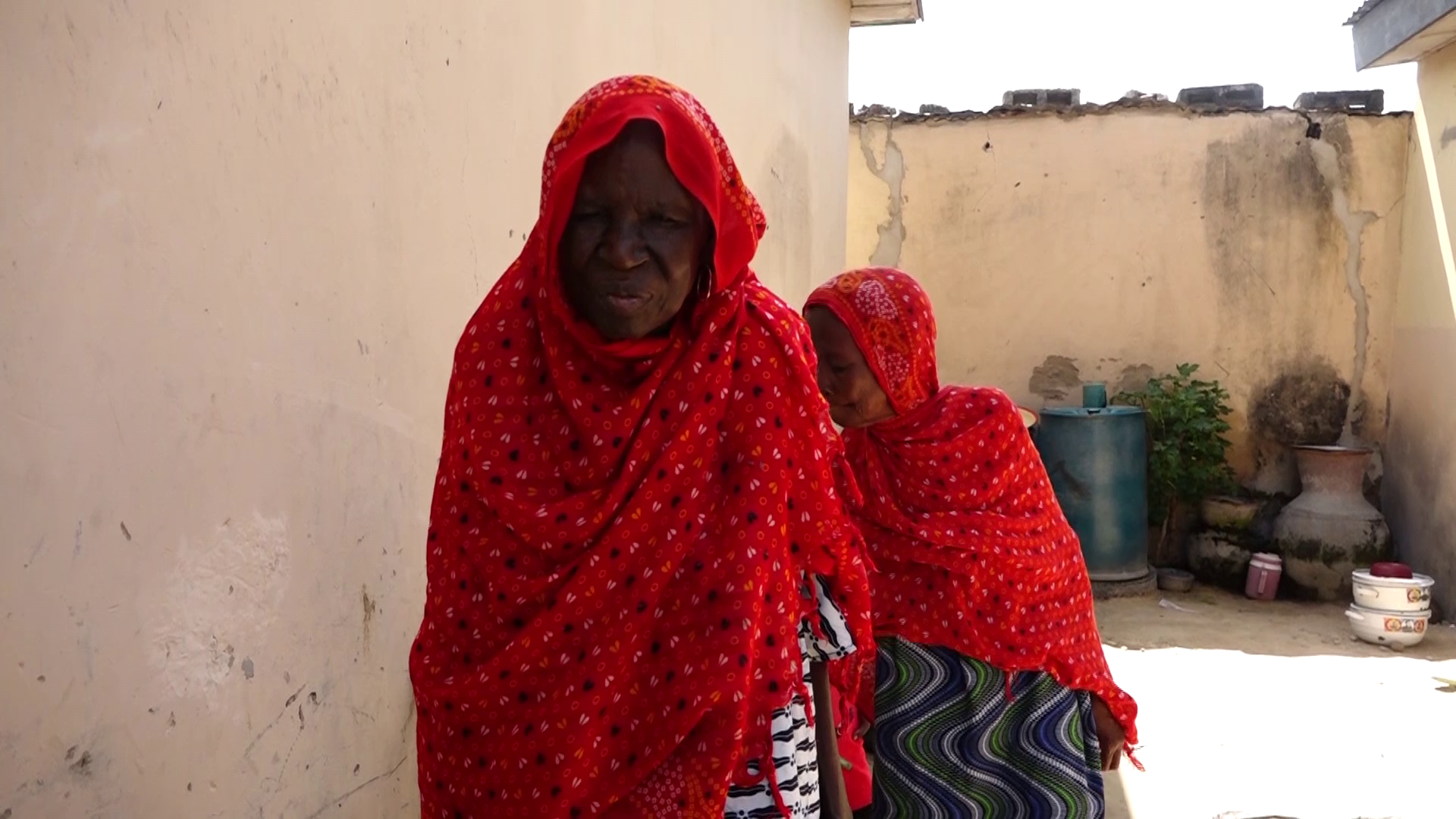
Beyond the Storm: A call for inclusion
Whether fleeing an extreme weather event or conflict, “disabled people are among the most vulnerable, and are more likely to be side-lined in every aspect of the humanitarian assistance process,” said Cheick Ba, Norwegian Refugee Council (NRC)’s Country Director in Nigeria, in the wake of Mohamadou’s predicament.
“They face multiple barriers in accessing aid, information, healthcare and protection. We, humanitarians, must do much better in our work. We have to systematically identify and register displaced persons with disabilities,” said Ba.
Article 11 of the United Nations Convention on the Rights of Persons with Disabilities in risk and humanitarian emergencies, pays particular attention to the obligation of States and parties to undertake “all necessary measures to ensure the protection and safety of persons with disabilities in situations of risk, including situations of armed conflict, humanitarian emergencies and the occurrence of natural disasters.”
Environmental dangers and natural disasters like the Borno flood, can lead to the onset of many types of disabilities, and inaccessible environments prevent persons with disabilities from taking part in social and economic recovery. Rehabilitation and reconstruction efforts, therefore, must not only be inclusive and responsive to the needs of all people, including PWDs, but should include the latter’s participation, to ensure that their needs and rights are respected.
Women with disabilities, Aji, are a particularly vulnerable group whose needs should be included at all stages of recovery and reconstruction efforts.
But that is in the long run, in the short run, their survival depends on the goodwill of neighbours and family – those who dare look their way, not to scorn their ordeal or simply talk eyes to their grief.
As the waters recede and Maiduguri takes stock of the damage, there is a sense of loss so profound it is hard to put into words. Lives have been shattered, homes destroyed, communities torn apart. But amid the wreckage, there is also a spirit of resilience, as elderly PWDs are left adrift, far from the government’s reconstruction plans.
In the absence of government support, Zara Aji, for instance has learnt to take each day as it comes. In the waning light of day, she lounges on the broken veranda of what was once her home.
At her last encounter with the reporter, giant houseflies buzzed lazily in the thick air, around her, their tiny, winged bodies hovering over her face as if drawn to the scent of her sorrow. They alighted on her eyelids, her cheeks, her lips—silent witnesses to the desolation that had swept through her life. She did not flinch. She did not swat them away. Instead, she sat in stoic, heartbreaking inaction, allowing the flies to do as they pleased. Their buzzing filled the air with a strange, almost haunting hum, as though they too, mourned the loss she had endured.
For Zara Aji, there is no going back to what was. The flood has changed everything. On several days, she relives through the darkness of her existence, that fateful night in September, when the skies over Maiduguri wept with a fury rarely seen, and the Alau Dam collapsed, spilling its contents into the vulnerable heart of Borno, submerging the homes and lives of its people. Gwange, the neighbourhood where she had lived for years, was now a shell of itself—a landscape drowned in mud and sorrow.
Aji, at 83 and visually impaired, could not see the destruction around her. But she could feel it in the cold touch of the air, the dampness that clung to her skin, and the hollow echo of the neighbourhood’s once-familiar sounds.
Her frail, fragile memories remain a quiet witness to the horror of the reptilian flood that invaded her home, threatening to drown her. Aji was drowning, but salvation came on the back of her grandson’s love, in a poignant moment that whispered of a debt long owed and finally repaid.
Environment
WHO Ramps Up Flood Emergency Response in Nigeria as Health Risks Mount
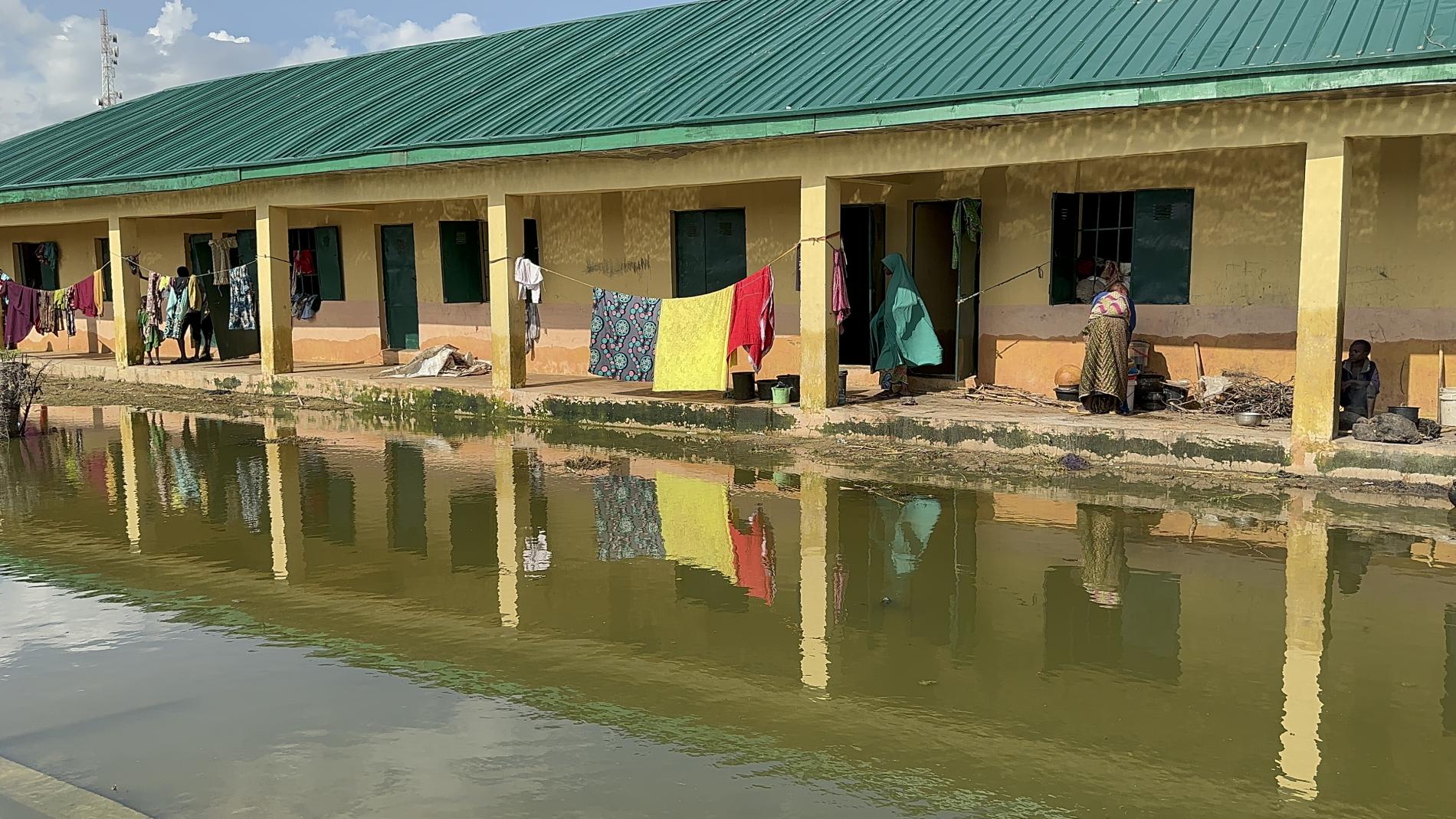
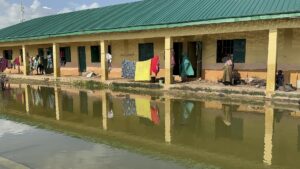
Abuja – In response to devastating floods that have affected over 610,000 people across Nigeria, the World Health Organization (WHO) is intensifying its support to provide critical health assistance. The severe flooding has displaced more than 415,000 people, caused 201 deaths in 15 states, and inundated over 115,000 hectares of farmland, sparking concerns about rising food insecurity and the spread of infectious diseases.
In the northeastern city of Maiduguri, Borno State, more than 230,000 people have been impacted after a major dam collapsed following heavy rains. The floods have disrupted access to essential services, including health facilities, schools, and markets. Fourteen health facilities have been submerged, and major health risks such as acute watery diarrhea, malaria, and other waterborne diseases, alongside malnutrition, are of growing concern.
WHO has swiftly deployed four mobile health teams, made up of 20 medical personnel, to provide emergency health care in the affected areas of Maiduguri. These teams are delivering treatment for minor ailments, conducting routine immunizations, offering antenatal and postnatal care, and providing mental health services. They are also coordinating medical referrals to larger hospitals. Additionally, a WHO team of 50 volunteers has been dispatched to carry out active disease surveillance in camps for displaced persons, focusing on waterborne and vaccine-preventable diseases.
To address the rising threat of malnutrition and vector-borne diseases, WHO, in collaboration with state health authorities, has supplied food, blankets, and long-lasting insecticide-treated mosquito nets to camps like the Asheikh Jarma settlement. A cold storage facility has been established at a local hospital to store vaccines and laboratory samples, ensuring vital health services continue despite the flooding.
“The flooding in Nigeria poses a severe public health challenge, necessitating a swift, agile, and comprehensive response,” said Dr. Walter Kazadi Mulombo, WHO Representative in Nigeria. “Close collaboration between government and partners like WHO is essential to mitigate the crisis.”
The Nigerian federal government, through the National Emergency Management Agency (NEMA), has launched a multisectoral emergency response in coordination with local health authorities, WHO, and other partners. The Ministry of Health has activated emergency response call centers to ensure timely intervention.
In Jigawa State, one of the hardest-hit areas, authorities have converted public buildings and schools into shelters for displaced people. Food rations, blankets, and mosquito nets have been distributed. WHO has provided the state with $45,000 worth of essential drugs, including rapid malaria diagnostic kits and anti-malarial medications. Similar support is being dispatched to Bauchi and Kogi, two other severely affected states.
“We are grateful to WHO for their critical contribution in preventing disease outbreaks among flood victims in temporary camps,” said Dr. Mohammed Kainuwa, Commissioner of Health for Jigawa. “These supplies are especially vital for protecting displaced pregnant women and children, who are the most vulnerable.”
NEMA spokesperson Manzo Ezekiel warned that the situation could deteriorate further as floodwaters flow toward central and southern states in the coming weeks. WHO has pledged to continue working closely with Nigerian authorities to manage the ongoing health crisis and protect lives.
“WHO will remain committed to supporting the government in its efforts to mitigate the impact of this ongoing health emergency and save lives,” added Dr. Mulombo.
-

 Uncategorized7 years ago
Uncategorized7 years agoThese ’90s fashion trends are making a comeback in 2017
-

 Uncategorized7 years ago
Uncategorized7 years agoAccording to Dior Couture, this taboo fashion accessory is back
-

 Uncategorized7 years ago
Uncategorized7 years agoThe final 6 ‘Game of Thrones’ episodes might feel like a full season
-

 Insight7 months ago
Insight7 months agoTinubu sacks two heads of govt agencies, picks replacements
-

 News10 months ago
News10 months agoNigeria Moves Up In Corruption Perception Index – TI
-

 Uncategorized7 years ago
Uncategorized7 years agoThe old and New Edition cast comes together to perform
-

 Uncategorized7 years ago
Uncategorized7 years agoUber and Lyft are finally available in all of New York State
-

 Uncategorized7 years ago
Uncategorized7 years agoMod turns ‘Counter-Strike’ into a ‘Tekken’ clone with fighting chickens


